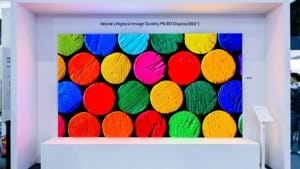Apple may have upgraded M4 MacBook Pro with quantum dot display technology
Apple may have added quantum dot technology to the M4 MacBook Pro display, enhancing its colour accuracy and performance while staying eco-friendly.

Apple might have discreetly enhanced the display technology in its M4 MacBook Pro by introducing quantum dot technology. While the laptop’s screen already stands out with its brightness of up to 1,000 nits for SDR content, this potential upgrade could make it even more impressive.
Table Of Content
A first for Apple’s MacBook lineup
Big Apple display news, they have adopted quantum dots for the first time. The latest MacBook Pro’s (M4) use a quantum dot (QD) film rather than a red KSF phosphor film.
— Ross Young (@DSCCRoss) November 14, 2024
In the past, Apple went with the KSF solution due to better efficiency and lack of cadmium (Cd), but the… pic.twitter.com/5olq9lEHs9
Ross Young, CEO of Display Supply Chain Consultants (DSCC), revealed on X that Apple has adopted quantum dot technology in the M4 MacBook Pro for the first time. Until now, MacBook Pro models have relied on red KSF phosphor films for their displays. These films are known for being cost-effective and efficient, but Apple avoided quantum dot films in the past due to environmental concerns.
Quantum dot films in earlier products contained cadmium, a toxic element that conflicted with Apple’s commitment to eco-friendly practices. Over the years, this has likely influenced Apple’s preference for safer alternatives like KSF phosphor films.
Modern quantum dot films: A game changer
However, technological advancements have led to the development of cadmium-free quantum dot films. These new films eliminate the toxic element and outperform traditional KSF phosphor films in several areas. According to Ross Young, these updated quantum dot films are highly efficient and deliver a superior colour gamut and motion performance. He described the new films as offering “as good or better performance” than their predecessors, which may explain Apple’s decision to embrace the technology finally.
If true, this move could further cement Apple’s reputation for innovation while maintaining its environmental values. The M4 MacBook Pro, which has already received praise for its stunning display, might now provide even more vibrant colours and smoother visuals, raising the bar for laptop displays.
Quantum dot’s rise in display technology
Quantum dot technology has been a hallmark of high-end televisions for years, particularly in premium models like Samsung’s QLED TVs. The technology enhances colour accuracy and overall image quality, making it a favourite among TV manufacturers. With Apple potentially bringing this feature to the M4 MacBook Pro, it’s possible you could experience the same exceptional picture quality in your everyday laptop use.
Our recent hands-on experience with the M4 MacBook Pro confirmed its outstanding display. It offers sharp visuals, impressive contrast, and crisp image quality—traits that could be partly attributed to quantum dot enhancements. If this upgrade becomes standard across future models, you might see a noticeable improvement in display performance.
While Apple hasn’t officially confirmed the use of quantum dot technology in the M4 MacBook Pro, this development signals its willingness to adopt innovative materials to enhance its products. Whether you’re a creative professional or someone who values a top-tier display, this could be an exciting advancement.
















